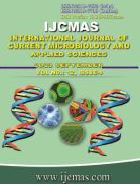


 National Academy of Agricultural Sciences (NAAS)
National Academy of Agricultural Sciences (NAAS)

|
PRINT ISSN : 2319-7692
Online ISSN : 2319-7706 Issues : 12 per year Publisher : Excellent Publishers Email : editorijcmas@gmail.com / submit@ijcmas.com Editor-in-chief: Dr.M.Prakash Index Copernicus ICV 2018: 95.39 NAAS RATING 2020: 5.38 |
Sepsis is a life threatening systemic inflammatory response to an infection or tissue damage. Bile salts are known to maintain intestinal barrier function. The current study investigated the protective role of bile salt against sepsis-induced lethality. Cecal slurry prepared from donor mice was administered intra-peritoneally to C57BL/6 male mice to induce sepsis. Animals subjected to cecal slurry were given either saline or bile salt (8 and 16 mg/ kg b.wt) intravenously 2 h before cecal slurry administration and observed for 10 days for survival, bacterial load, and hematological changes. Changes in oxidant-antioxidant level, inflammation, and histology were observed in lung, liver, and kidney. Acute toxicity of bile salt was conducted in accordance to OECD guidelines. Results showed that cecal slurry administration induced sepsis in mice as seen by increased bacterial load in peritoneal fluid and blood. 16 mg/kg b.wt of bile salt increased the survival rate against sepsis from 10% to 50% and diminished the bacterial load in peritoneal fluid and blood. Bile salt administration significantly (P < 0.05) ameliorated the cecal slurry induced increase in lipid peroxidation and myeloperoxidase activity; decrease in total thiol, catalase, and superoxide dismutase levels, spike in WBC count, and altered histological changes such as leukocyte infiltration and hemorrhage. Acute toxicity study of bile extract revealed no lethality along with any significant change in body weight. The findings of the current study indicate that bile salt administration increased survival rate possibly by effective bacterial clearance and protecting tissues from oxidative damage and inflammation.
 |
 |
 |
 |
 |